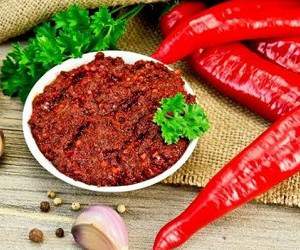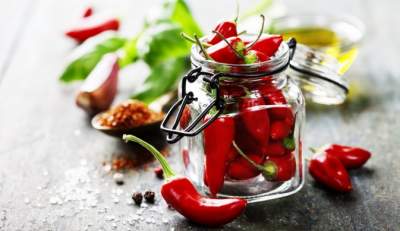 If you love spices, the restaurant always choose the spicy dish and the house without red pepper can’t even cook a dessert, you’re doing it right.
If you love spices, the restaurant always choose the spicy dish and the house without red pepper can’t even cook a dessert, you’re doing it right.
Nothing above you ridiculed and called a Serpent dragon – scientists believe that spicy food, prolong life. Of course, not all so fine, have spicy dishes and dark sides, but the advantages it is always important drawbacks.
Why it’s good:
Extends the life. The study, which was conducted among more than half a million Chinese in over 7 years, showed that those who eat spicy food 6 times a week, 14% less prone to premature death, and those who eat such meals 2 times a week, by 10% in comparison with those who does not like spicy.
Reduces weight. It has been proved that hot peppers reduces appetite and speeds up metabolism. Scientists at Purdue University. Indiana, in 2011 conducted a study and concluded that people feel more satiated after “burning” dishes. Previous experiments have shown that people, who, during a meal eat a lot of spicy, eat less fat.
Spicy seasonings also affect the metabolism, I’m sure Dr. Gregory Thorkelson, associate Professor of the Department of psychiatry and gastroenterology at the University of Pittsburgh. “That is why we are after spicy food becomes hot. Some data suggests that capsaicin (the substance that causes a burning sensation in the mouth) increases the body’s ability to burn calories,” he says.
Another reason for this phenomenon may be that due to the burning sensation in the mouth we eat slower, says Dana Hannes, senior nutritionist and Professor in the School of public health at the University of California, Los Angeles: “If you eat slowly, saturation comes faster.”
Relieves pain. Capsaicin stimulates the body’s own opioids — endorphins, says Torkelson. However, this effect is observed rather for local external application, than when eating spicy food.
Anti-inflammatory effect. Studies confirm that capsaicin can treat autoimmune diseases such as rheumatoid arthritis. Torkelson going to the notes that in countries with spicy cuisine of the exposure to these diseases from the people below.
It has antimicrobial action. Studies show that capsaicin has anti-bacterial properties and may, but to a lesser extent, anti-fungal. That’s why early hot pepper is often used as a preservative, says Hannes.
Why it’s bad:
Causes burns. If pepper in the dish were too spicy, it can burn papillae on the tongue that are responsible for distinguishing tastes, says Hannes. Fortunately, this effect is only temporary.
“Even if you eat a Scotch bonnet, the hottest peppers, and damage buds, they come back pretty quickly,” she says. If it turned out that you ate a lot of hot peppers, drink milk, it is the most effective way to “extinguish the fire” in your mouth.
It is important that it was regular milk, not skim because capsaicin binds with the fat molecules. Capsaicin thins the blood. Most people who are generally healthy, spicy food won’t hurt, but if you are already taking anticoagulants, capsaicin may further enhance their effect.
Can burn hemorrhoids. One of the unpleasant qualities of capsaicin is that it in the digestive system does not break and can cause burns. Inside nothing, most likely, will not happen, but at the outlet it can be. Especially discomfort it could cause in that case, if you have hemorrhoids.








